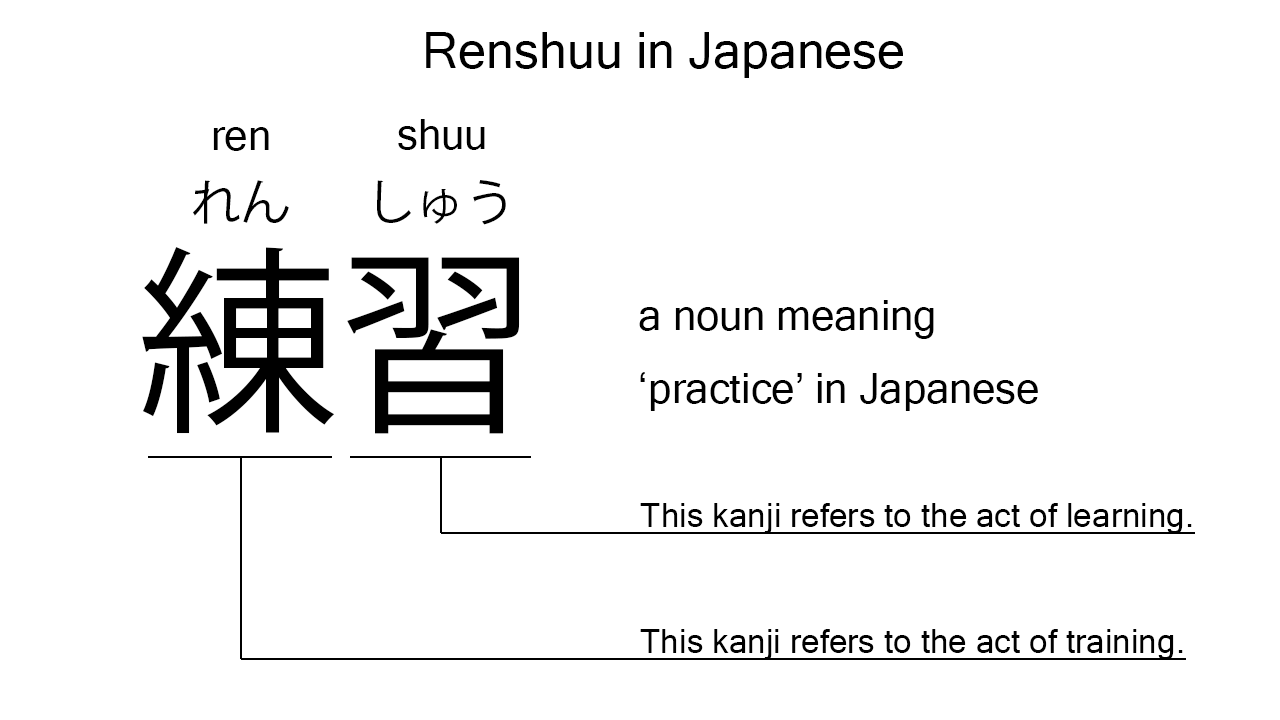What does “renshuu” mean in Japanese?
Native speakers say “renshuu” often to mean ‘practice’ in Japanese. Perhaps, some Japanese learners know this word as it is sometimes used in Japanese textbooks. In this blog post, however, I will explain this word in detail based on its kanji expression. And also, I will explain how to use it through example sentences. My explanations would help Japanese learners understand “renshuu” more clearly. Then, let’s get started!
Contents
Definition and meanings of “renshuu”
Let me start with the definition and meanings of “renshuu”.
- renshuu – 練習 (れんしゅう) : a noun meaning ‘practice’ in Japanese. Depending on the context and situation, this can also mean ‘drill’ or ‘training’.
Normally, Japanese native speakers use this noun to refer to activities which they do repeatedly to improve their skills. So, the usage is similar to those of the English nouns written above.
The definition and meanings are not that difficult, I think. To understand this noun more clearly, however, let me explain its kanji characters in detail, one by one.
What does “renshuu” literally mean in Japanese?
The kanji expression of “renshuu” consists of the following two kanji characters:
- 練 : a kanji character used to refer to the act of training, drilling, or exercising.
- 習 : a kanji character used to refer to the act of learning or studying. This can also be found in other words like “narau“.
These two kanji characters tell us that “renshuu” literally means ‘training and learning’ in Japanese. This literal interpretation is very close to the actual meanings, I think.

When we meet new kanji expressions, we should check their kanji characters in detail to understand their meanings clearly and deeply. In many cases, kanji characters tell us a lot about the meanings of the expressions they form. Actually, here, we could get the better understanding of “renshuu” through the detailed kanji check above.
So far, I’ve explained the definition and meanings of “renshuu” together with its kanji characters. Then, let me explain how to use it through the example sentences below.
Example #1: how to say “practice” in Japanese
watashi wa piano no renshuu ga suki desu – 私はピアノの練習が好きです (わたしはぴあののれんしゅうがすきです)
I like practicing the piano.
Below are the new words used in the example sentence.
- watashi – 私 (わたし) : a pronoun meaning ‘I’ in Japanese.
- wa – は : a binding particle working as a case marker or topic marker. In the example, this works after “watashi” to make the subject in the sentence.
- piano – ピアノ (ぴあの) : a noun meaning ‘piano’ in Japanese. This can also work as plural. Learn more about Japanese plural.
- no – の : a case particle joining two nouns. Normally, the first one can work as a modifier to describe the second. In the example, this works to join “piano” and “renshuu”. The formed phrase literally means ‘piano practice’ in Japanese.
- ga – が : a case particle used to make the subject word or the object word in a sentence. In the example, this is used after “piano no renshuu” to make the object in the sentence.
- suki – 好き (すき) : the stem part of the na-adjective, “sukina”, which means ‘favorite’ in Japanese. Native speakers, however, often use this as an individual word to mean ‘to like’ or ‘to love’ in Japanese. In the example, this is used to mean ‘to like’.
- desu – です : an auxiliary verb used after a noun or adjective to make it polite. Probably, this is well known as a part of Japanese desu form. In the example, this is used after “suki” to make it sound polite.
This is a typical usage of “renshuu”. In this example, it works as a part of the noun phrase, “piano no renshuu”, which literally means ‘piano practice’ in Japanese. The original meaning of the Japanese sentence is more like ‘I like piano practice’, but it has been translated more naturally.
Example #2: another usage of “renshuu”
renshuu de ensou ga yoku naru – 練習で演奏が良くなる (れんしゅうでえんそうがよくなる)
Practice improves performance.
Below are the new words used in the example sentence.
- de – で : a case particle used to indicate a cause or reason. In the example, this is used after “renshuu” to say what improves the performance.
- ensou – 演奏 (えんそう) : a noun meaning ‘musical performance’ in Japanese.
- yoku – 良く (よく) : one conjugation of the i-adjective, “yoi“, which means ‘well’, ‘good’, or such in Japanese. In the example, it has been conjugated for the better connection with its following word.
- naru – なる : a verb meaning ‘to become’, ‘to get’, ‘to turn’, or such in Japanese. In the example, this works together with “yoku” to literally mean ‘to become better’ in Japanese. It has been translated as just ‘to improve’, though.
This is another typical usage of “renshuu”. When we want to say “practice” in Japanese, this noun is always a very good option.
Summary
In this blog post, I’ve explained the definition and meanings of “renshuu” in detail based on its kanji expression. And also, I’ve explained how to use it through the example sentences. Let me summarize them as follows.
- renshuu – 練習 (れんしゅう) : a noun meaning ‘practice’ in Japanese. Depending on the context and situation, this can also mean ‘drill’ or ‘training’. These two kanji characters literally mean ‘training and learning’ in Japanese. This literal interpretation is very close to the actual meanings. Japanese native speakers use this noun to refer to activities which they do repeatedly to improve their skills. So, the usage is similar to those of the English nouns written above.
Hope my explanations are understandable and helpful for Japanese learners.